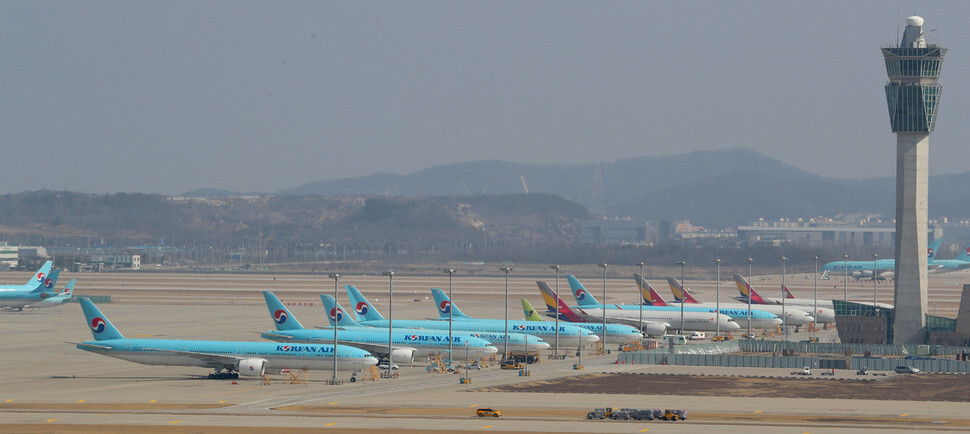hankyoreh
Links to other country sites 다른 나라 사이트 링크
S. Korean businesses apprehensive about Japan’s entry restrictions on travelers from S. Korea

South Korean businesses are on edge after the Japanese government’s announcement on Mar. 5 of entry restrictions on South Korean travelers. The South Korean government and experts are anticipating the possibility of the domestic economy suffering a severe shock if the entry restrictions drag out in the long term.
To begin with, the aviation and travel industries will be most directly affected by the entry restrictions. Currently, Korean Air has suspended seven of the 17 Japan routes it had in place just before the coronavirus outbreak, while seven more have been reduced and three have been kept in place. The number of flights to Japan per week has already fallen from 202 to 105. The entry restriction measures raised the likelihood that even these remaining flights will be fully suspended. Low-cost carriers (LCCs) have already suspended most of their Japanese routes.
Short-term impact is minimal; impact potentially severe if situation prolongs
Companies involved in export and import transactions with Japan are not expecting the suspension of personal exchange to have an immediate major impact on material trade, but their apprehensions are also apparent. LG Electronics said, “We have a local sales agency in Japan, so we aren’t experiencing any difficulties for now, but if [the restriction measures] last into the long term, we could face more difficulties in duties that require meetings and discussions for things like local procurement of parts.”
Mun Byung-ki, a senior research fellow at the Korea International Trade Association (KITA), said, “There are no major issues with conducting our currently contracted business through video conferences and email, so the short-term effects are unlikely to be significant.”
“But if it lasts into the long term, it could create hassles in terms of things like finding new clients and signing new contracts,” he predicted.
The impact of the entry restrictions on distribution and consumer goods appears likely to be relatively small, as they are domestic demand industries that involve almost no personal exchange with Japan. But Japan-based consumer goods businesses such as Uniqlo -- which has been struggling with losses amid a boycott in the wake of Japan’s export control measures last year -- are scared that the boycott will be reignited. The mainstay automobile industry is seen as being relatively free from losses, as it does not involve significant interchange with Japan. Hyundai Motor predicted, “If anything, the Japanese finished car brands operating within South Korea could end up in a more difficult position than the domestic automakers.”
According to figures from KITA, South Korea’s trade with Japan last year amounted to US$28.4 billion in exports and US$47.6 billion in imports. Major export items include petroleum products, steel plates, semiconductors, and precision chemicals. The first- to fourth-ranked import items are semiconductors, semiconductor manufacturing equipment, steel plates, and plastics.
“The impact of Japan’s entry restriction measures is not going to be as large as in the cases of China or Vietnam, where South Korean companies have large-scale investment projects and orders under way,” said a key Ministry of Trade, Industry and Energy official in a telephone interview.
“It appears that what we will need is for the [South Korean] government to talk to the Japanese government to discuss flexible permissions on the necessary individuals who meet certain conditions, rather than unilateral restriction measures,” the official suggested.
By Kim Eun-hyoung, staff reporter, and the economy team
Please direct comments or questions to [english@hani.co.kr]

Editorial・opinion
![[Column] Season 2 of special prosecutor probe may be coming to Korea soon [Column] Season 2 of special prosecutor probe may be coming to Korea soon](https://flexible.img.hani.co.kr/flexible/normal/500/300/imgdb/original/2024/0426/3317141030699447.jpg) [Column] Season 2 of special prosecutor probe may be coming to Korea soon
[Column] Season 2 of special prosecutor probe may be coming to Korea soon![[Column] Park Geun-hye déjà vu in Yoon Suk-yeol [Column] Park Geun-hye déjà vu in Yoon Suk-yeol](https://flexible.img.hani.co.kr/flexible/normal/500/300/imgdb/original/2024/0424/651713945113788.jpg) [Column] Park Geun-hye déjà vu in Yoon Suk-yeol
[Column] Park Geun-hye déjà vu in Yoon Suk-yeol- [Editorial] New weight of N. Korea’s nuclear threats makes dialogue all the more urgent
- [Guest essay] The real reason Korea’s new right wants to dub Rhee a founding father
- [Column] ‘Choson’: Is it time we start referring to N. Korea in its own terms?
- [Editorial] Japan’s rewriting of history with Korea has gone too far
- [Column] The president’s questionable capacity for dialogue
- [Column] Are chaebol firms just pizza pies for families to divvy up as they please?
- [Column] Has Korea, too, crossed the Rubicon on China?
- [Correspondent’s column] In Japan’s alliance with US, echoes of its past alliances with UK
Most viewed articles
- 11 in 5 unwed Korean women want child-free life, study shows
- 2AI is catching up with humans at a ‘shocking’ rate
- 3[Column] Has Korea, too, crossed the Rubicon on China?
- 4[Column] Season 2 of special prosecutor probe may be coming to Korea soon
- 5Division commander ordered troops to enter raging flood waters before Marine died, survivor says
- 6[Photo] More Sewol paintings by Hong Sung-dam
- 7Court dismisses comfort women’s suit against government for signing 2015 agreement with Japan
- 8[Editorial] Seoul’s callous response to disability rights protests
- 9Netflix imperialism: Are Korea’s days as the platform’s favorite content creator numbered?
- 10Marriages nosedived 40% over last 10 years in Korea, a factor in low birth rate